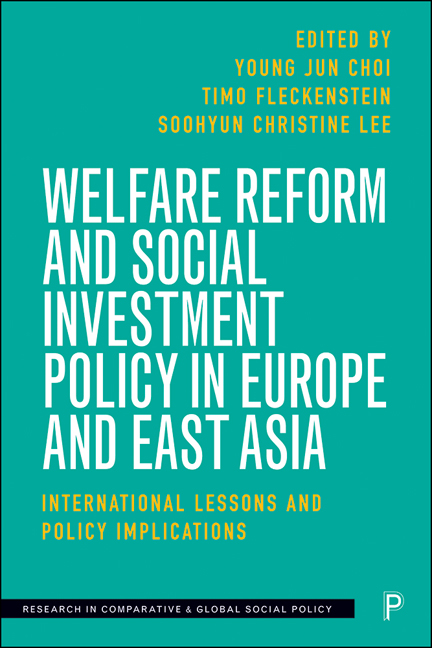Book contents
- Frontmatter
- Contents
- List of figures and tables
- Notes on contributors
- Acknowledgements
- Preface from the series editors
- 1 Introduction: social investments and welfare reform in Europe and East Asia
- 2 Work–family policy expansion and the idea of social investment: the cases of Germany, England, South Korea and Japan
- 3 Private education in South Korea: lessons for the West from past mistakes?
- 4 How do family background and shadow education affect academic performance and labour market outcomes in South Korea? Reasons for redistributive social investment
- 5 Employability, higher education and the knowledge economy
- 6 Does social investment make the labour market ‘flow’? Family policies and institutional complementarities in Italy, Spain, Japan and South Korea
- 7 The social investment approach and gender division of housework across East Asia and Europe
- 8 Employment outcomes of social investment in latecomer countries
- 9 Estimation of the human capital depreciation rate: an international comparison and policy implications in South Korea
- 10 Changing patterns of grandparenting and their implications for active ageing in England and South Korea
- 11 The governance of social investment policies in comparative perspective: long-term care in England and South Korea
- 12 Towards greater social investments and equality in Europe and East Asia: policies and politics
- Index
11 - The governance of social investment policies in comparative perspective: long-term care in England and South Korea
Published online by Cambridge University Press: 21 December 2021
- Frontmatter
- Contents
- List of figures and tables
- Notes on contributors
- Acknowledgements
- Preface from the series editors
- 1 Introduction: social investments and welfare reform in Europe and East Asia
- 2 Work–family policy expansion and the idea of social investment: the cases of Germany, England, South Korea and Japan
- 3 Private education in South Korea: lessons for the West from past mistakes?
- 4 How do family background and shadow education affect academic performance and labour market outcomes in South Korea? Reasons for redistributive social investment
- 5 Employability, higher education and the knowledge economy
- 6 Does social investment make the labour market ‘flow’? Family policies and institutional complementarities in Italy, Spain, Japan and South Korea
- 7 The social investment approach and gender division of housework across East Asia and Europe
- 8 Employment outcomes of social investment in latecomer countries
- 9 Estimation of the human capital depreciation rate: an international comparison and policy implications in South Korea
- 10 Changing patterns of grandparenting and their implications for active ageing in England and South Korea
- 11 The governance of social investment policies in comparative perspective: long-term care in England and South Korea
- 12 Towards greater social investments and equality in Europe and East Asia: policies and politics
- Index
Summary
Introduction
The welfare state is now confronted with a series of new changes in demographic, industrial and family structures that can be considered new social risks (Taylor-Gooby, 2004; Bonoli, 2007; Morel et al, 2012). The demographic shift, coupled with the transition towards a service economy, means that care services have, since the late 1990s, become a key social investment policy in industrialised societies in East Asia, as well as Western advanced industrial democracies. Nearly all Organisation for Economic Co-operation and Development (OECD) countries are experiencing significant ageing of their populations due to increasing life expectancy and declining fertility rates. According to a European Social Policy Network (ESPN) report (Bouget et al, 2015), long-term care is defined as a new social risk resulting from cumulative demographic, economic, and social factors. Consequently, there have been efforts to develop social policies, including long-term care services, which can effectively address new social risks.
Faced with soaring demands for care services in an ageing population and the need to contain the cost of care provision, many Western welfare states have reformed their long-term care services (OECD, 2005; Newman et al, 2008; Pavolini and Ranci, 2008). However, the need for long-term care services is growing in other countries, including newly industrialised countries in East Asia, as the ageing population is increasing at a rate that far greater than in Western Europe (see Phillips and Chan, 2002). The search for effective longterm care policies is thus one of the most urgent and significant challenges in welfare regimes across Europe and Asia.
In line with the neoliberal view of social policy as costly and unproductive, long-term care is often portrayed as a cost. However, looking at long-term care from a social investment perspective involves moving away from an exclusive focus on costs, and towards an emphasis on social capital and social cohesion, which are essential to sustainable growth. Social investment strategies in the context of longterm care have social and economic returns, such as reducing disability and dependency in old age by improving older people's capacity for health promotion and independent living, and decreasing the ‘hidden costs’ of informal care – for example, the loss of tax contributions from family caregivers who are no longer able to work (European Social Network, 2013).
- Type
- Chapter
- Information
- Welfare Reform and Social Investment PolicyInternational Lessons and Policy Implications, pp. 291 - 314Publisher: Bristol University PressPrint publication year: 2021

